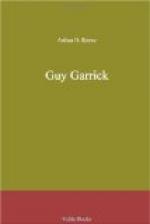In spite of his careful examination of the wrecked car, Garrick found practically nothing more than Dr. Mead had already told him. It was with considerable relief that Miss Winslow saw the two again climbing up the slope in the direction of the road.
A few minutes later we were on our way back, Dr. Mead and Garrick leading the way in the doctor’s car, while I accompanied Miss Winslow in her own car.
She said little, and it was plain to see that she was consumed by anxiety. Now and then she would ask a question about the accident, and although I tried in every way to divert her mind to other subjects she unfailingly came back to that.
Tempering the details as much as I could I repeated for her just what had happened to the best of our knowledge.
“And you have no idea who it could have been?” she asked turning those liquid eyes of hers on my face.
If there were any secret about it, it was perhaps fortunate that I did not know. I don’t think I am more than ordinarily susceptible and I know I did not delude myself that Miss Winslow ever could be anything except a friend to either Garrick or myself. But I felt I could not resist the appeal in those eyes. I wondered if even they, by some magic intuition, might not pierce the very soul of man and uncover a lying heart. I felt that Warrington could not have been other than he said he was and still have been hastening to meet those eyes.
“Miss Winslow,” I answered, “I have no more idea than you have who it could be.”
I was telling the truth and I felt that I could meet her gaze.
There must have been something about how I had phrased my answer that caused her to look at me more searchingly than before. Suddenly she turned her face away and gazed at the passing landscape from the car.
She said nothing, but as I continued to watch her finely moulded features, I saw that she was making an effort to control herself. It flashed over me, somehow, that perhaps, after all, she herself suspected someone. It was not that she said anything. It was merely an indefinable impression I received.
Had Warrington any enemies, not in the underworld, but among those of his own set, rivals, perhaps, who might even stoop to secure the aid of those of the underworld who could be bought to commit any crime in the calendar for a price? I did not pause to examine the plausibility or the impossibility of such a theory. What interested me was whether in her mind there was such a thought. Had she, perhaps, really more of an idea than I who it could be? She betrayed nothing of what her intuition told her, but I felt sure that, even though she knew nothing, there was at least something she feared.
At last we arrived at Dr. Mead’s and I handed her out of the car and into the tastefully furnished little house. There was an air of quietness about it that often indefinably pervades a house in which there is illness or a tragedy.




